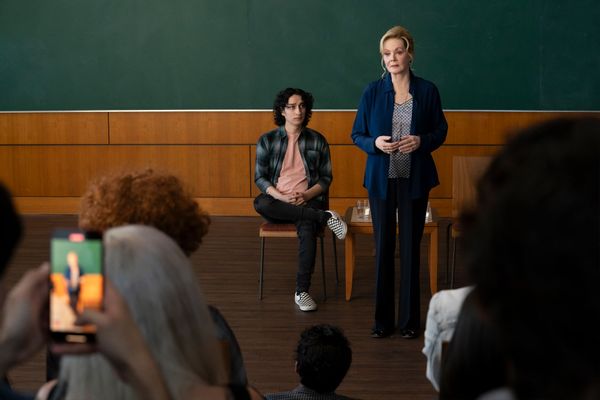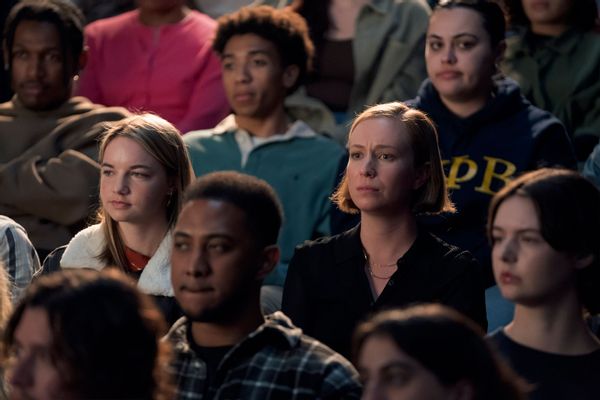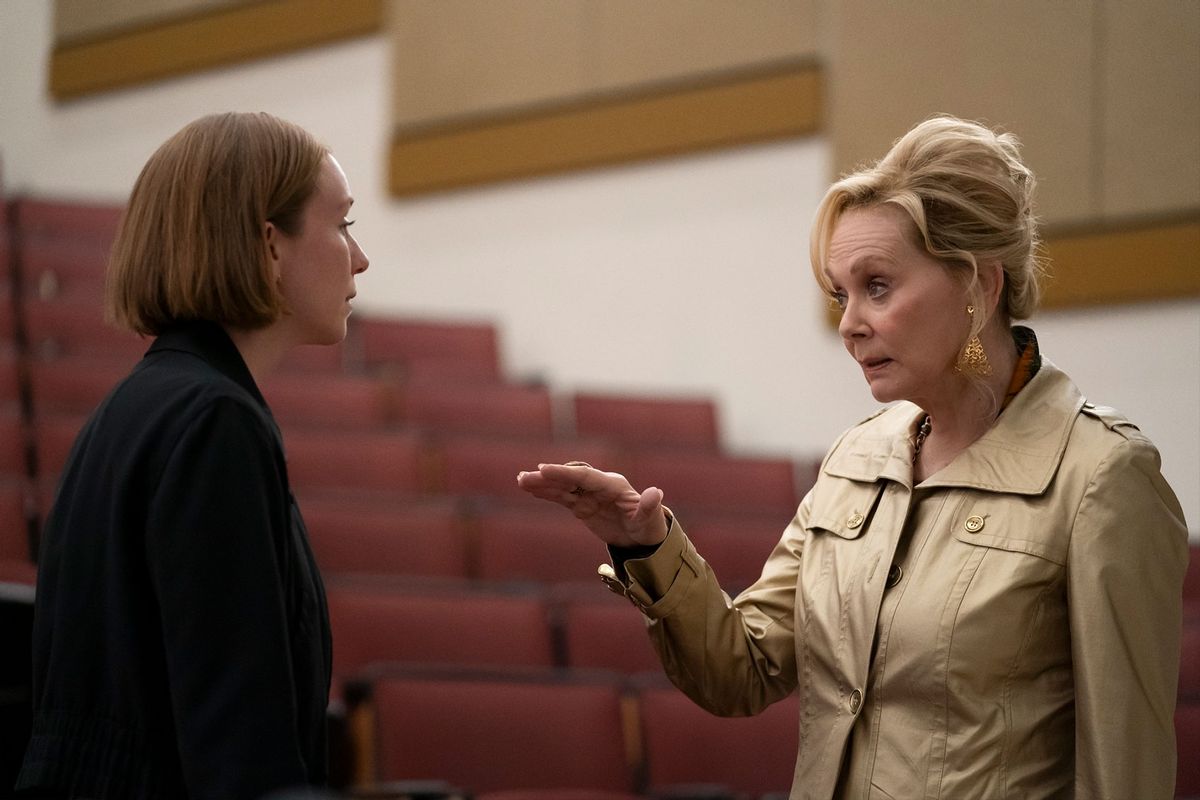“Hacks” at its best is an exercise in wish fulfillment. That, and the regrettable gifts-with-purchase that come with realizing long-deferred dreams. The outcome of “Yes, And,” the season’s penultimate episode, proves this when at long last, Deborah Vance (Jean Smart) wins the job that has long eluded her after decades of playing to pliant Vegas slot jockeys content to giggle at the broadest pabulum.
Getting there took a lot of clawing through others' low expectations and moral flogging session at the finish line, courtesy of students at her alma mater, a situation she set in motion years before more of them were born. Her crime? Telling the same bad jokes that everyone else was telling.
We’re constantly reminded that Deborah is one of the toughest people to work for in show business, and that the same that made her wealthy and iconic also makes her a bit monstrous. And yet, the love she shares with her protégé Ava (Hannah Einbinder) is obvious to anyone with a working heart.
Deborah understands that working with Ava makes her more than a sharper performer. Ava makes her a better person, whether Deborah likes it or not. Of course, the world isn't privy to the moments when Deborah shows she's grown by defending bisexual people to a group of her comedy contemporaries at a gathering from which they'd long excluded her.
Ava, meanwhile, endures the brunt of Deborah's hazing in the form of verbal jabs about her appearance, and an anxiety-inducing threat of a lawsuit.
The payoff is that the appeal Ava helped Deborah build makes her a contender again, a legitimate superstar with the weight to seriously campaign for the late-night hosting position she lost years ago due to bad press orchestrated by an envious ex-husband. Like Ellen DeGeneres before her, she was canceled before it was a thing.
 Jean Smart in "Hacks" (Max)Being a comedian on a hot streak holds new perils in the modern age, none as reputationally deadly as the Internet. A sure sign that every effort that Ava and her team have made on Deborah’s behalf is paying off is that a reporter from The New Yorker, Meena Elahi (Shakira Barrera), joins Deborah and Ava at Berkeley to shadow the comic as she’s set to her receive an honorary degree from alma mater, University of California, Berkeley.
Jean Smart in "Hacks" (Max)Being a comedian on a hot streak holds new perils in the modern age, none as reputationally deadly as the Internet. A sure sign that every effort that Ava and her team have made on Deborah’s behalf is paying off is that a reporter from The New Yorker, Meena Elahi (Shakira Barrera), joins Deborah and Ava at Berkeley to shadow the comic as she’s set to her receive an honorary degree from alma mater, University of California, Berkeley.
Right on time, and not long after they set foot on Berkeley’s campus, a supercut of her decades-old material featuring her telling racist, sexist, ableist jokes begins tearing through social media.
We’re talking seriously crusty fossils such as, “Asians making cars? That’s like Polish people making lightbulbs!” and an inhumane zinger about migrants (“If we’re going to leave water at the border for these people, we might as well leave Spanish-to-English dictionaries too!”) that would play well to the Fox Nation crowd.
A significant number of students react by vowing to protest Deborah’s ceremony. Shortly afterward her manager Jimmy (Paul W. Downs) calls with the bad news that the network has canceled her test show. Deborah receives this in a state of total inebriation; she’s attending a frat party in the hopes of courting support among students who aren’t so P.C. (She also makes a guest appearance with the campus' improv squad, which doesn't go as well . . . but inspired the episode's title.)
Being a comedian on a hot streak holds new perils in the modern age, none as reputationally deadly as the Internet.
In her fury and vulnerability she parrots arguments many comics have made concerning outrage culture’s supposed chilling effect on their freedom to be edgy. “I'm sorry, people are too easily offended now! If you don’t like a joke, don’t laugh!” she bellows.
“They’re not,” Ava replies. Deborah points out that she was only making jokes that everyone was making at the time. Yes, Ava agrees, “And . . . the jokes were hurtful. And sh**ty. Both things can be true. You get to be rich and famous for making jokes, and people are allowed to have their reactions to them.”
But she really lashes out at Ava’s reasonable suggestion for a remedy. “I mean, why not use your comedian brain to fight through your defensiveness and think outside of yourself? Isn't that what good comics do? Why don’t you just apologize?”
“No,” Deborah spits. “Never apologize for a joke.”
“Yeah, you keep saying that,” Ava says, “But why not?”
“Because . . . you just don't,” Deborah finishes, to which Ava can only respond, “OK. Good one.”
Given our regular eruptions over mythical cancel culture and its impact on comedy, the events of “Yes, And” were inevitable. “Hacks” co-creators Lucia Aniello, Jen Statsky and Paul W. Downs, who co-wrote “Yes, And” with Samantha Riley, designed “Hacks” to dialogue with the comedy side of the entertainment industry not only as it was in Deborah's day but as it is now.
Deborah’s pride in being a vintage Hollywood diva is a main tension between her and Ava, who comes from the new school of confessional stand-up that believes in accountability. Deborah, being the flinty pugilist that she is, resents her younger comedy twin for pushing her to be more attuned to progressive, empathetic viewpoints.
 Hannah Einbinder in "Hacks" (Max)As always the series’ writers constantly err on the side of generosity when it comes to Deborah’s evolution, understanding her generation of female comics had to both navigate and placate the old boys’ network if they wanted to get anywhere. In this “Yes, And” reminds us that Deborah is in part modeled on Joan Rivers, who reserved her most scathing put-downs for herself. Even so, she regularly offended members of marginalized groups when she didn’t stop to think about the impact of her words or wasn’t counseled otherwise by her version of Ava.
Hannah Einbinder in "Hacks" (Max)As always the series’ writers constantly err on the side of generosity when it comes to Deborah’s evolution, understanding her generation of female comics had to both navigate and placate the old boys’ network if they wanted to get anywhere. In this “Yes, And” reminds us that Deborah is in part modeled on Joan Rivers, who reserved her most scathing put-downs for herself. Even so, she regularly offended members of marginalized groups when she didn’t stop to think about the impact of her words or wasn’t counseled otherwise by her version of Ava.
But it also speaks to the widespread compulsion among industry luminaries to circle the wagons around their own when people excavate gross, lazy jokes told in the distant past that violates the current image we might have of them. Ancient terrible tweets confronted Trevor Noah after he became the new "Daily Show" host.
In 2018 Vulture compiled first-person accounts submitted by comics taking accountability for their past thoughtless material, a list that includes Weird Al Yankovic, Sasheer Zamata, Joel Kim Booster and Patton Oswalt — generally unproblematic folks in most of our imaginings. To a person they recount these missteps not from a position of defensiveness or shame, but as a matter of evolution and growth.
Such insight also acknowledges that perpetuating odious views that have real-world consequences for people who are vilified for simply trying to exist isn't merely cruel, it's lazy hackery. James Acaster hilariously flipped out over the whole "I'm a stand-up comedian, I'm meant to challenge people!" five years ago. He'd probably have a few things to say about Deborah's supercut.
We need your help to stay independent
This is where the wish-fulfillment aspect of “Hacks” kicks in most effectively because Deborah actually does get canceled in miniature. A Berkeley administrator tells her the school won't move forward with her ceremony in light of the planned protests out of caution and fear that violence might break out.
Instead, the dean invites her to attend a town hall where students plan to air their grievances. Her crisis PR person advises her not to say anything. But Deborah goes against her advice and her own stubbornness and does something wildly uncharacteristic – she watches the supercut, and absorbs the shame.
Then she shows up to the student gathering to answer for her past mistakes.
Honest public contrition can augment a star's profile too.
“Hacks” doesn’t sacrifice its commitment to entertain amid Deborah’s teachable moment and doesn’t simply leave it at her apology. The laugh-out-loud moments in that scene don't undercut the sensitivity and significance of the situation, which includes Deborah delivering an unqualified apology. “I think I'll just listen because I've said enough,” she tells the assembled Berkeley students. “And to be totally honest, I'm really afraid of saying the wrong thing.”
This sounds like a comedian’s nightmare if you believe the common cries of “free speech” and “it’s just jokes.” Deborah recognizes that too, and Smart does an excellent job of wordlessly performing her sense of humiliation at what her past version of herself said in public and thought was funny. Handling hecklers lobbing insults while cloaked in darkness is an artform. But to sit in front of a young woman who performs a tight two for in which she describes the Islamophobia her family has borne over the years, despite being Punjabi, takes another kind of bravery.
Vance also makes Deborah look visibly, painfully humbled when she admits in front of a roomful of strangers, along with a reporter who could send her back into exile with a single article, that she doesn’t know what the term “ableist” means.
Want a daily wrap-up of all the news and commentary Salon has to offer? Subscribe to our morning newsletter, Crash Course.
On Monday’s episode of “The Daily Show,” Jon Stewart weighed in on the conservative media’s penchant to harness “cancel culture” to gin feigned outrage for nearly every type of distraction while pointing out that the only people getting canceled are those standing up Donald Trump.
“Outrage is the engine of our modern media economy,” Stewart says, “And sometimes, someone loses a job or something else happens like that, that should never . . . happen.”
In context, he’s talking about the likes of former Republican congresswoman Liz Cheney, one of the few who vocally opposed Trump’s poisonous influence on her party and lost her seat in the House as a result. This bears pointing out because one doubts that Stewart had much of a problem with Megyn Kelly being fired by NBC.
Indeed, that hiring proves the point Ava makes while Deborah spins out. She assures her boss that despite how her brush with supposed cancellation feels, few celebrities at her level actually get canceled. To the woman who lost the late-night hosting chair in the same era when she told those cruel jokes this sounds like more smug assurances from a 20-something with no clue of what it means to suffer.
That makes the last lesson Deborah learns that much sweeter, which is that honest public contrition can augment a star's profile too.
“’Deborah Vance is by no means the obvious choice for late night. Her missteps are numerous and not entirely forgivable. No doubt there will be more,’” Elahi writes in her piece, which Ava reads aloud to Deborah. “’But for all Vance's typical Boomerness, there's a curiosity that goes beyond age and taps into something more human: our desire to understand each other.’”
Deborah is one of the greats. She also placed more value on joining comedy’s exclusively male echelon for most of her career only to reject its gatekeepers once they allow her in the room. She’s said and done many regrettable things, yes . . . and owning them helped her become the first woman to host an 11:30 p.m. show on a broadcast network, history actual TV networks have yet to make.
Elahi concludes that Deborah’s flaws exhibit someone trying to connect with humanity in her attempts to connect with her own, which some would say is the essence of great comedy. That, The New Yorker writer, makes her watchable. “Hacks” fans would certainly agree.
New episodes of "Hacks" stream Thursdays on Max.



Shares